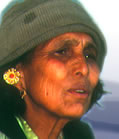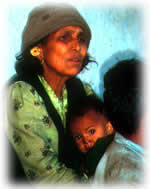 |
 |
||
 |
|||
|
RELATED THEMES economics education employment and income health migration social relationships OTHER LOCAL THEMES BACKGROUND |
gender
The testimony of a Brahmin schoolteacher (Nepal 9) is an articulate and passionate discussion of gender issues. The narrator describes how girls are treated as "strangers" in their own homes before marriage, the conventional belief being that they are "born to go to another's [home]". She deplores the domestic burden society places on women and argues that men are perfectly capable of doing their share: "Men can make their beds themselves.... They can sweep their rooms themselves. It is not right that only women should cook meals. Men can also cook meals." Significantly, she says the workload is more evenly divided in poor than in rich households and that there is more discussion and joint decision-making among lower castes. She strongly advocates independent property rights for women. Other issues she addresses are the gap, at the political level, between declared principles (in the constitution, as well as party manifestos) and practice in the area of women's rights; the need for loans and skills training; and the importance of educated women taking a determined stand on behalf of the less privileged members of their sex. In her view, women's awareness and the capacity "to act according to what one thinks is right" will only come about through education. Another testimony (Nepal 15) is devoted almost entirely to descriptions of and comments on women's domestic lives, and how men treat their wives and family responsibilities. The narrator is highly critical of men who "want to be heroes" but who don't look after their families. There are some hopeful signs of change: educational prospects are improving for girls and, where they exist, women's literacy groups, awareness-raising classes, credit schemes and savings groups are helping to boost status and self-confidence. In one new interview (Nepal 27) the narrator says approvingly: "[Savings groups] didn't do a good job as they focused on men only. whatever was saved the women didn't get, and it was swindled by men. Now the NGOs of these days encourage women to come forward and do things themselves." Everyone agrees that women are increasingly aware of their rights but there is clearly resistance to these being put into practice. Employment opportunities remain restricted: "In any institution there are more men, only a few women. And if they are working, whether in any institutions or schools, [women] are looked down upon. They say, these girls are not decent" (Nepal 9). Such a comment illustrates how gossip and disapproval can be used to constrain women, making them hold back for fear of being rejected. The departure of some girls to Bombay as prostitutes, which seems to have begun at least three decades ago, is said by some to be in decline, helped in part by the efforts of HIV-positive returnees to educate others about HIV-AIDS risks. Nepal 22 contains a long section on this topic, although the narrator says the practice has declined since the arrest of one of the main traffickers. Two new interviews are especially interesting on gender issues: Nepal 30 is the powerful story of a returned prostitute, a girl from the hills who was "coaxed, misled and taken" to an Indian brothel, and Nepal 28 tackles the issue of continuing caste discrimination, and suggests that women are more prejudiced than men. "Our Bahun, Chettri women simply do not realise that as women themselves they should not look down on other women and make them feel small. Our males are less bothered about this matter. women are far behind when it comes to untouchability.". quotes about gender"It is due to this society or due to the dominant way of thinking that a son boasts of being a son. My son and daughter are one or two years apart in age.but he never works as much as the daughter does. I don't want to practise any discrimination. but still I haven't been able to make him mature in his thinking. "I should not make tea and give it to others; I am a son!" - that sort of thinking is still in his mind." "You cannot clap with only one hand or the cart cannot move on one wheel, both the men and the women should be equal in all aspects." "In our hilly regions.the convention is to send the sons to school while the daughters are made to attend to domestic chores like collecting fodder and looking after the young ones. If they are sent to school, they barely reach the age of 15 before they are considered ripe for marriage. In their own homes they are considered 'strangers' who must one day attend to the care of another's home. So, they are sent away like buffaloes." "Most of the work is done by women but the credit goes to men. It's the same with jobs; the men can go far and get any line of work but the women cannot even go out to study. The parents are always worried that, if they send their daughter out, others will not think well of them, so it will be difficult for them to get married. That's why you don't see that many women in the offices. It's not because they can't do [the work] but because of social obstacles." "I remember my life without giving birth to a son. I used to come from the forest after cutting the grass but there wouldn't be any food for me, so I used to cry. This is not like the city; here you are neglected if you cannot give birth to a son. Now we have many [NGOs] here, [telling us] whether you have a daughter or a son it's the same. But the villagers.say that daughters are not equal to sons. Those who have lost the seeds must plough again. Sons are the seeds of men so one has to try for them." "Now if [as a woman] you have your own [money], you can manage the way you want. if family members want to sell [a calf] and use the money for a daughter's marriage then one could say: 'No, I want to educate [my children] as I have money from the sale of that female calf and a deposit in so-and-so bank or in the group'. So it makes a lot of difference when you have your own [money]." "In my opinion to respect men more than women is a wrong thing. Those days people used to tell you not to listen [to] woman's talking. What could women do? But I know many works are done by women. It is one woman's hand to manage household works. She has to cook, wash all things by herself. When she wants to talk, then why do people want to stop her speaking? It is a wrong thing. People ask what women will do, going to school? But in my opinion, women will do better than men, going to school." |
|
 Gender issues are a prominent theme in many of the interviews, including those gathered in 2002 (Nepal 24-32). Narrators say women still tend to earn half as much as men for the same work, and lack equal property rights; they work very long days and when ill, are less likely than men to be sent to hospital. Heavy workloads,
Gender issues are a prominent theme in many of the interviews, including those gathered in 2002 (Nepal 24-32). Narrators say women still tend to earn half as much as men for the same work, and lack equal property rights; they work very long days and when ill, are less likely than men to be sent to hospital. Heavy workloads,